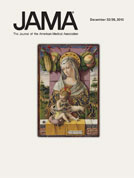 With the third retraction of a paper by Anil Potti this weekend, plus details of various investigations dribbling out, we decided to check in with the world’s two leading medical journals about whether they planned to retract the papers of Potti’s they’d published.
With the third retraction of a paper by Anil Potti this weekend, plus details of various investigations dribbling out, we decided to check in with the world’s two leading medical journals about whether they planned to retract the papers of Potti’s they’d published.
JAMA published two papers by Potti and colleagues: One, “Gene Expression Signatures, Clinicopathological Features, and Individualized Therapy in Breast Cancer,” appeared in 2008. It has been cited 51 times, according to Thomson Scientific’s Web of Knowledge, and was the subject of two letters. In one, a correspondent expressed concerns about the lack of information in the study about
how the biospecimens, which are the foundation of these molecular studies, were collected, transported, preserved, processed, and stored for the actual testing.
The other, “Age- and Sex-Specific Genomic Profiles in Non-Small Cell Lung Cancer,” appeared last year, and has been cited five times.
On both papers, a spokesperson told us:
The JAMA editors don’t have any information to share about that paper. Of course, if there is a retraction, it will be noted in JAMA and online.
NEJM published “A genomic strategy to refine prognosis in early-stage non-small-cell lung cancer” in 2006 and corrected it in 2007. The study has been cited 290 times, according to Thomson Scientific’s Web of Knowledge.
A NEJM spokesperson told us:
I don’t have anything new to report. We don’t have any plans to retract the paper.
We’ll update as we hear anything else.
For “Age- and Sex-Specific Genomic Profiles in Non-Small Cell Lung Cancer” a brief perusal of the figures and text is enough to immediately spot discrepancies where the text says one thing and the figure shows another. Apparently the reviewers had more important things to spend their time on than to do this. And that is the other message from the Potti saga. The failure, time after time after time, of peer reviewers to do their job.
Could not agree more.
The explosion of communication media and fora in which publication is possible has led to an unprecedented increase in the number of so-called “scientific” publications. On the other hand it is the same increase of exposure through the internet which has also led to the unprecedented possibility of transparent scrutiny.
Over the years secretive peer-review has become a rather “cozy” process for the “establishment” to promote and protect its own rather than for the protection of scientific quality or the scientific method. In this age of open access, conventional peer-review by the “established authorities” in a field has become increasingly sloppy and anachronistic.
The sins of the reviewers – which have become common even if not by the majority – are coming home to roost.